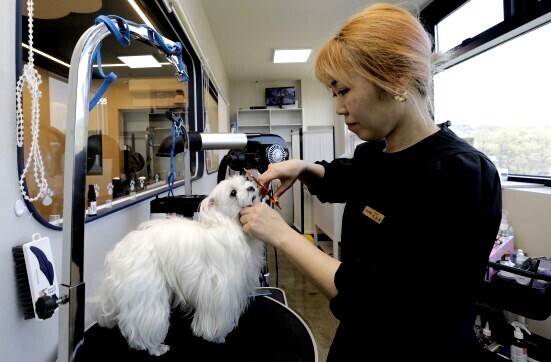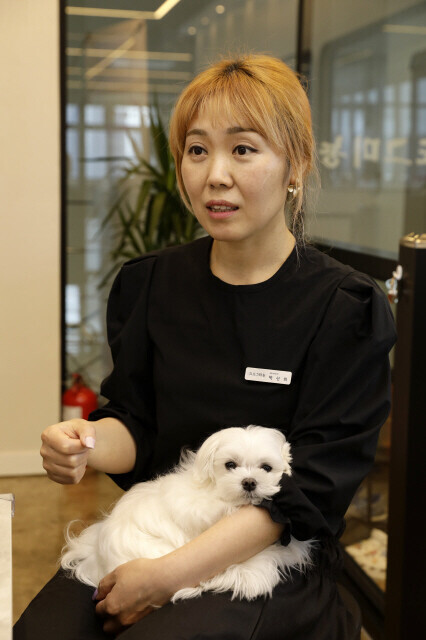hankyoreh
Links to other country sites 다른 나라 사이트 링크
Once denied license due to disability, S. Korean dog stylist opens her own shop

When 44-year-old pet stylist Park Seon-hui hugged a poodle entrusted to her by a customer, the poodle, who at first seemed wary of strangers, quickly began wagging its tail.
“Well hasn’t your fur gotten long? I'll get you looking yourself in no time.”
Park, who is deaf, obtained a Level 2 canine stylist certification from the Korean Kennel Club (KKC) in February. The certification is Korea’s nationally recognized dog grooming license.
Park was granted her license exactly one year since being kicked out of a certification testing center for having a disability. After countless twists and turns, Park opened her own dog grooming shop called Dog Minyong in Osan, Gyeonggi Province, on April 11.
“My dream has finally come true,” Park told the Hankyoreh during an interview at her shop on Friday.
Park’s disability is an acquired one. Last year, Park underwent surgery for a cochlear implant — devices attached to auditory nerves that convert sound stimuli to electrical signals. Now, she’s better able to understand people when they speak to her, so long as they speak slowly.
In February of last year, Park took out her disability registration card at the dog stylist certification test center and asked the proctor if there was anything she should be aware of. Doing so lost her the right to take the exam.
“I’m sorry. Disabled people cannot take the exam,” the proctor told her.
Park explained that she had passed the written exam without any problems, but the proctor told her there must have been some kind of mistake and asked that she leave the examination room. Park, who was able to understand what was happening through an app that converts speech into text, had to pack up and leave the testing site.
Park said that there had been no such information in the announcement for the test, but that the KKC’s website stated that people with disabilities were not eligible to take the exam.
After working so hard for her dream and then having it be dashed, Park felt like her “world was caving in” on her.
“I was sobbing as I left the examination center,” she said, “Why did I have to become disabled and go through life being treated like this?” Park said she even had thoughts about not wanting to live anymore.

Park was diagnosed with a hearing impairment at the age of 29 due to hearing loss during childbirth. She used hearing aids to make her day-to-day life easier, but as her hearing continued to deteriorate, it became increasingly difficult to make out what people were saying.
Park, who had been working as a wedding hair and makeup stylist prior, began to ponder other work options due to difficulties communicating with her clients. Park says she first became interested in pet grooming after grooming her own dog, Makdungi. Finally, she decided to enroll in an academy and prepare for the official certification exam.
Despite being told she could not sit the exam, Park did not let this defeat her. Last February, she filed a complaint with the National Human Rights Commission of Korea (NHRCK), the country’s human rights watchdog.
An acquaintance in New Zealand had encouraged her, saying that they’d seen people with prosthetic legs teaching gym where they were.
“I wanted to change things so that other people with disabilities wouldn’t have to deal with unreasonable treatment,” Park told the Hankyoreh. “If I got my license and did what I wanted to do, maybe someone else out there will be encouraged by seeing me do so.”
In March of last year, the disability rights group People Breaking Down the Walls of Disability also filed a complaint with the NHRCK containing the same content as that of Park. On the same day the group held a press conference in front of the NHRCK building — March 23 — Park underwent cochlear implant surgery. She said that she had weighed getting the surgery for a long time since it required putting a device inside her ear and decided to go ahead with it because she “wanted to hear better.”
The KKC sent an e-mail to Park the day after the press conference in which it said that it would delete the relevant regulations, saying they “hadn’t realized that these rules could be discriminatory.”
In May of the same year, an official from the NHRCK, Park, and the KKC sat down and drafted an agreement that included the deletion of the discriminatory regulations, and the complaint was closed. Park, finally able to take the exam, passed the Level 3 canine stylist certification in June last year and Level 2 this February.
“Even if I can't hear as well as others, I can communicate with pets better than anyone else,” Park said. She added that in the more than a year that she had been preparing for the exam, she hadn’t been bitten or even so much as scratched by any of her canine clients.
“I have some trouble hearing people, sure, but there's no such problem when it comes to communicating with animals. I guess animals know that I adore them,” Park said.
Now that she’d opened the dog grooming shop of her dreams, Park said that every day is exciting.
“I went around handing out leaflets by myself in 25 apartment buildings, but I was more excited than tired. I'm happy that I can do what I wanted to do,” Park remarked.
But throughout this whole process, Park says she’s felt very keenly how today’s world revolves around people without disabilities.
“Please don't view people with disabilities and people without disabilities as completely separate groups,” she asked.
“I’ve come to realize all the inconveniences that people with disabilities experience, like how hard it is to watch live broadcasts that don’t have subtitles,” Park said. “When I confront this hatred whereby it feels like only non-disabled people are treated as citizens on and offline, I think to myself, ‘But anyone can become disabled at any time.’”
“I want people to know that disabled people can do plenty of things that non-disabled people do. I also want to tell other people with disabilities who are struggling with this to be courageous.”
By Kim Yoon-ju, staff reporter
Please direct questions or comments to [english@hani.co.kr]

Editorial・opinion
![[Column] Season 2 of special prosecutor probe may be coming to Korea soon [Column] Season 2 of special prosecutor probe may be coming to Korea soon](https://flexible.img.hani.co.kr/flexible/normal/500/300/imgdb/original/2024/0426/3317141030699447.jpg) [Column] Season 2 of special prosecutor probe may be coming to Korea soon
[Column] Season 2 of special prosecutor probe may be coming to Korea soon![[Column] Park Geun-hye déjà vu in Yoon Suk-yeol [Column] Park Geun-hye déjà vu in Yoon Suk-yeol](https://flexible.img.hani.co.kr/flexible/normal/500/300/imgdb/original/2024/0424/651713945113788.jpg) [Column] Park Geun-hye déjà vu in Yoon Suk-yeol
[Column] Park Geun-hye déjà vu in Yoon Suk-yeol- [Editorial] New weight of N. Korea’s nuclear threats makes dialogue all the more urgent
- [Guest essay] The real reason Korea’s new right wants to dub Rhee a founding father
- [Column] ‘Choson’: Is it time we start referring to N. Korea in its own terms?
- [Editorial] Japan’s rewriting of history with Korea has gone too far
- [Column] The president’s questionable capacity for dialogue
- [Column] Are chaebol firms just pizza pies for families to divvy up as they please?
- [Column] Has Korea, too, crossed the Rubicon on China?
- [Correspondent’s column] In Japan’s alliance with US, echoes of its past alliances with UK
Most viewed articles
- 1Is Japan about to snatch control of Line messenger from Korea’s Naver?
- 2‘We must say no’: Seoul defense chief on Korean, USFK involvement in hypothetical Taiwan crisis
- 3[News analysis] Using lure of fame, K-entertainment agency bigwigs sexually prey on young trainees
- 4Will NewJeans end up collateral damage in internal feud at K-pop juggernaut Hybe?
- 5‘Weddingflation’ breaks the bank for Korean couples-to-be
- 6Division commander ordered troops to enter raging flood waters before Marine died, survivor says
- 7No good, very bad game for Korea puts it out of Olympics for first time since 1988
- 8“Korea is so screwed!”: The statistic making foreign scholars’ heads spin
- 9The dream K-drama boyfriend stealing hearts and screens in Japan
- 10[Column] The clock is ticking for Korea’s first lady